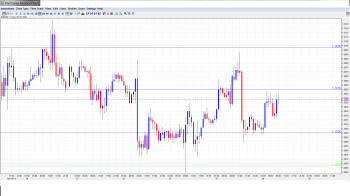EUR/USD is steady in Friday’s European session, with the pair trading in the mid-1.30 range. Speculation is rising that the ECB may reduce interest rates at next week’s policy meeting, and this could certainly affect the movement of the pair next week. Looking at economic news, there was more weak news out of Germany, as German Import Prices declined for the first time since January. Eurozone M3 was a disappointment, missing the estimate. In the US, there was some relief from the string of bad numbers, as Unemployment Claims beat expectations. The trading week wraps up with the release of US Advance GDP and UoM Consumer Sentiment.
Here is a quick update on the technical situation, indicators, and market sentiment that moves euro/dollar.
EUR/USD Technical
Asian session: Euro/dollar gained ground, touching a high of 1.3048 before consolidating at 1.3023. The pair has edged higher in the European session.
Current range: 1.3000 to 1.3050.
Further levels in both directions:
<img alt=”EUR_USD Daily April 25″ src=”https://www.forexcrunch.com/wp-content/uploads/2013/04/EUR_USD-Daily-April-25-350×196.png” width=”350″ height=”196″ />
<img alt=”EUR USD Daily Forecast April 24″ src=”https://www.forexcrunch.com/wp-content/uploads/2013/04/EUR-USD-Daily-Forecast-April-24-350×196.png” width=”350″ height=”196″ /> <img alt=”EUR USD Daily Forecast April 23″³ src=”https://www.forexcrunch.com/wp-content/uploads/2013/04/EUR-USD-Daily-Forecast-April-23-350×196.png” width=”350″³ height=”196″³ /> <img alt=”EUR USD Daily Forecast April 22″ src=”https://www.forexcrunch.com/wp-content/uploads/2013/04/EUR-USD-Daily-Forecast-April-22-350×196.png” width=”350″ height=”196″ /> <img alt=”EUR USD Daily Forecast April 19″ src=”https://www.forexcrunch.com/wp-content/uploads/2013/04/EUR-USD-Daily-Forecast-April-191-350×196.png” width=”350″ height=”196″ /> <img alt=”EUR USD Daily Forecast April 18″ src=”https://www.forexcrunch.com/wp-content/uploads/2013/04/EUR-USD-Daily-Forecast-April-18-350×196.png” width=”350″ height=”196″ /> <img alt=”EUR USD Daily Forecast April 17″ src=”https://www.forexcrunch.com/wp-content/uploads/2013/04/EUR-USD-Daily-Forecast-April-17-350×196.png” width=”350″ height=”196″ /> <img alt=”EUR USD Daily Forecast April 16″ src=”https://www.forexcrunch.com/wp-content/uploads/2013/04/EUR-USD-Daily-Forecast-April-16-350×196.png” width=”350″ height=”196″ /> <img alt=”EUR USD Daily Forecast April 15″ src=”https://www.forexcrunch.com/wp-content/uploads/2013/04/EUR-USD-Daily-Forecast-April-15-350×196.png” width=”350″ height=”196″ /> <img alt=”EUR USD Daily Forecast April 11″ src=”https://www.forexcrunch.com/wp-content/uploads/2013/04/EUR-USD-Daily-Forecast-April-112-350×196.png” width=”350″ height=”196″ /> <img alt=”EUR USD Daily Forecast April 11″ src=”https://www.forexcrunch.com/wp-content/uploads/2013/04/EUR-USD-Daily-Forecast-April-111-350×196.png” width=”350″ height=”196″ /> <img alt=”EUR USD Daily Forecast April 10″ src=”https://www.forexcrunch.com/wp-content/uploads/2013/04/EUR-USD-Daily-Forecast-April-10-350×196.png” width=”350″ height=”196″ />
Below: 1.3000, 1.2960, 1.2880, 1.2805, 1.2750 and 1.27.
Above: 1.3050, 1.31, 1.3140, 1.3170, 1.3255, 1.3290, 1.3350 and 1.34.
1.30 continues to provide support, but is vulnerable. 1.3050 is providing weak resistance. 1.31 is stronger.
Euro steady in the mid-1.30 range – click on the graph to enlarge.
EUR/USD Fundamentals
6:00 German Import Prices. Exp. -0.0%. Actual -0.1%.
8:00 Eurozone M3 Money Supply. Exp. 3.0%. Actual 2.6%.
8:00 Eurozone Private Loans. Exp. -0.8%. Actual -0.8%.
12:30 US Advance GDP. Exp. 3.1%. See how to trade this event with USD/JPY .12:30 US Advance GDP Price Index. Exp. 1.3%.
13:55 US Revised UoM Consumer Sentiment. Exp. 73.3 points
13:55 US Revised UoM Inflation Expectations.
For more events and lines, see the Euro to dollar forecast
EUR/USD Sentiment
German data falters: Germany churned out weak economic numbers this week, and the disappointing data hurt the euro. The continental currency took it on the chin on Tuesday, dropping sharply as German Service and Manufacturing PMIs posted readings below the 50-point level. This indicates contraction in these sectors, and points to weakness in the German economy. On Wednesday, German IFO Business Climate dropped sharply, from 106. 7 points to 104.4. This missed the estimate of 106.4 points . There was no relief on Friday as German Import Prices dropped from 0.3% to -0.1%. The estimate stood at 0.0%. This was the first negative reading since January. These figures have raised concerns in the markets, since the Eurozone has little chance of an economic recovery if Germany, the most powerful economy on the continent, doesn’t take the lead with solid economic numbers.More talk of ECB rate cuts : The Eurozone seems to be lurching from one crisis to another, as we have seen with the Cyprus bailout mess and the political impasse in Italy. Add to the mix weak economic activity from major economies in the Eurozone, and we could have a recipe for an interest rate cut by the ECB. Speculation that the ECB will take action is growing, and on Thursday, Goldman Sachs stated that it expects a 0.25% cut at next week’s policy meeting. The well-respected firm also revised its outlook for Eurozone growth for 2013, lowering it from -0.5% to -0.7%. The ECB does not meet until Thursday, but the growing possibility of an interest rate cut promises to be a hot topic throughout next week.US posts solid employment data: The US has been on a roll, but not the good kind. Since late March, almost all key releases have pointed downwards, indicating weakness in the US economy. On Wednesday, it was the turn of Core Durable Goods, which dropped 1.4%, well below the estimate of a 0.5% gain. There was some good news on Thursday, as Unemployment Claims dropped to 339 thousand, beating the estimate of 352 thousand. However, the markets remain concerned about the pace and extent of the US recovery.Italy nominates Prime Minister: After months of paralysis, Italy finally seems closer to forming a government. Lawmakers couldn’t agree on a new president, and in a surprise move, Giorgio Napolitano, who was scheduled to step down, was reelected. Earlier this week, Enrico Letta was nominated as prime minister. Letta’s Democratic Party does not have a parliamentary majority, so he will have to form a coalition, which could prove difficult. Letta, who is only 46 years old, is considered a moderate and is liked within the Eurozone. He is expected to try and form an alliance with former PM Silvio Berlusconi. Once a new government is formed, it will be faced with an economy mired in recession and a sour electorate that is fed up with austerity measures.

